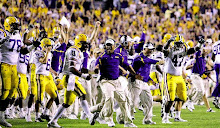Statement: Jarrett Lee's interceptions were the result of being behind in so many games and having to throw a lot to get back in the game.
Response: Mostly false.
Here's the breakdown of the game situation for Jarrett Lee's interceptions last season:
Four were thrown with LSU ahead. Three of these were with double-digit leads. The fourth resulted in a game-tying TD return by Alabama.
Four were thrown with the score tied. One of these was on the very first play of the game against Georgia and was returned for a touchdown.
Eight were thrown with LSU behind. Three of these deficits were seven points or less, so there was no pass-wackiness trying to catch up. One deficit was 14 points in the first quarter, so it was still too early to go pass-wacky (indeed, the run-pass ratio after going down 21 points to Troy was only slightly tilted in favor of the pass).
That leaves four out of sixteen where LSU was in semi-catchup or definite catchup mode: down 17-0 in the first quarter and 34-14 in the fourth quarter to Florida; down 45-31 with three and a half minutes left against Georgia (without Lee's previous two INTs leading to ten UGA points, the deficit may have been only 35-31); down 21-3 in the second quarter against Ole Miss.
I don't point this out to let the defense off the hook for its poor performance last season, but to provide a little context for what was going on in the game at the time Lee was picked off. Brad has already gone through defensive personnel and what expectations might be with the new coaches on that side of the ball, so I'll just offer up this comparison:
LSU's defense and John Chavis's squad faced six common opponents last season: Florida, Auburn, Georgia, Alabama, Mississippi State, and South Carolina. In four cases, Tennessee's defense allowed fewer points than LSU's.
UF: 23 vs. 44 (-21)
AUB: 7 vs. 14 (-7)
UGA: 26 vs. 38 (-12)
MSU: 3 vs. 24 (-21)
ALA: 29 vs. 21 (+8)
USC: 20 vs. 17 (+3)
The combination of the impressive numbers and rankings Tennessee's defense achieved last season and some of the promising players currently on LSU's defense leaves plenty of room for optimism on that side of the ball for 2009.
Having said that, I don't want to hear anything about how the 2009 defense is going to be night-and-day better than 2008. A lot of the players who were missing tackles and blowing assignments last season are back for more. They've been given the benefit of the doubt so far because of the red-faced rage over the co-DC experiment. Seeing as how most of the players on that side of the ball haven't proven they can get it done, I'm going to tactfully ignore any statements about how much better they are now until I see it on the field. Nobody from last year's defense gets to say they had a good year last year. Even the excitement over how well Rahim Alem got after the QB is tempered by the image of him kicking the ball after the play was over and putting Arkansas in much better position to kick a field goal.
I'm encouraged by the reports out there about a new attitude and more intensity on defense. But last year all the post-spring buzz was about how Richard Murphy was going to blow up in 2008 and who knows what else. Speculating passes the time, but let's see what happens when the Tigers roll into Athens for what should be their first test on October 3. If we're discussing problems with the defense or defensive struggles before then, it means they've had trouble with either Washington, Vandy, ULL, or Mississippi State. If that happens, the defense could end up as a redux of 2008.
Tigers to watch for in the 2019 MLB Draft
6 years ago









Agreed 100%. I'm not letting the defense off the hook either, and if you eliminate the interceptions against UGA, like you said, you've got a completely different scenario. Against Florida, we could not match their athletes and the amount of speed they possessed. Losing Harvin hurts them because not only was a he a playmaker, he was also a great decoy.
ReplyDelete